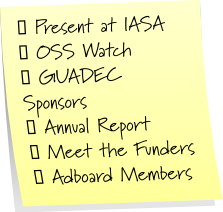 Chris Blizzard introduced me to Clay Johnson. I had such an interesting time talking to him about social networking, free and open source software, governments and fundraising that I asked if he’d share some of his points in a blog interview.
Chris Blizzard introduced me to Clay Johnson. I had such an interesting time talking to him about social networking, free and open source software, governments and fundraising that I asked if he’d share some of his points in a blog interview.
Meet Clay Johnson, Director of Sunlight Labs!
Hi Clay, you have a lot of experience with online social networking. Where’d you get that experience?
It’s weird– I started out with social networking before social networking was called “social networking.” In college, back in the early days of the web, my Dad would always ask me to look things up on the Internet for him. I began to get tired of answering questions, so I built a service that would let people ask questions and answer them online– that way, I figured, he could have a whole community of people answering his questions. That was KnowPost.com, the first “social network” I built on my own.
A few years later, I found myself working on the same kind of project with some friends called ZeroDegrees.com, which was a social networking service built into Outlook. And shortly thereafter, the Howard Dean Campaign hired me to be their lead programmer and build Dean Link, a privately branded social network. Then quickly found myself starting the company that created
My.BarackObama.com— yet
another social network.
It isn’t intentional, I swear! I find both socialness, and networking exhausting …
You now work at Sunlight Labs on “opening” the American government.
What’s that about? How can we help?
Our mission is to use technology to make government more open, accessible and accountable to its citizens. We’re now a community of about 1400 developers at
SunlightLabs.com. Last year our community built out about 100 different open source applications based on making government more open accountable, accessible and open.
The apps range from things like
Congrelate.com–which allows you to sort and view information about Congress, to
TransparencyCorps.org— our own Open Source Mechanical Turk, to
ThisWeKnow.org which takes data from the federal government and makes it relevant to your area and
GovPulse.us— a site that takes the Federal Register (the official Journal of the Federal Government) and turns it into something people can actually read.
Our hope is that our work will result in economic opportunity (GPS, Weather Data, the Human Genome– all built on government data!), a more accountable government, and more rational political debate as people have more access to facts. The fact that there’s more data on Manny Ramirez and his job performance than Nancy Pelosi’s is kind of crazy and we hope to change that.
I’ve heard you say you should never ask a developer for money. Most free and open source software projects turn to those they know best, developers, when they need funds. Why do you think that’s a bad idea?
Let me hedge here a little and say you shouldn’t ask a volunteer for money. For the same reason the folks at
Habitat for Humanity don’t come and ask you for money while you’re putting up drywall in one of their houses. There’s a spectrum when it comes to open source software. One one side there are projects that are
driven out of the hope for a larger good– I’d call these traditional volunteer projects– where people are donating their time to help make the world a better place. Then there’s the other hand: stuff that’s driven out of necessity. Obviously this is a spectrum and projects move within it. When you have stuff on the ideological side– stuff built genuinely not out of the desire to solve a specific problem, but to make the world a better place, then those developers are likely already donating to your project with their time.  They’re being altruistic already. When you have a developer giving their time out of
necessity, they’re getting a return on their investment– usually a more efficient workplace, better software for them to use, or some other personal need filled. It’s entirely appropriate to ask them for money as well– as their return on investment will be even greater.
How do you think free software projects can effectively engage with donors?
Now if I had the secret to make all open source software economically sustainable and as well funded as
commercial software every time– well, I’d have told everyone by now, and we’d all be rich working on projects we believe in. In the political world there’s a lot of best practices, but the one I like the most is to maintain long-term relationships with people via email and social media, and to make specific asks from them. So, for instance instead of saying “Donate to keep this project sustainable,” one could say “We need to build out XYZ, can you pay for ONE line of code to go to that project? Our estimate is that it’ll take X lines of code.”
Another thing you can do is look at what the clean energy community is doing– what if you created a code offset like we have carbon offsets now? What if an organization set up a website where folks could estimate the amount of free software they use and buy free software offsets on an annual basis, and make investments in free software projects? This works great because it helps donors alleviate their guilt for not contributing their time to open source projects, and makes it easy. I’d gladly put an open source offset sticker on my laptop to match my carbon offset sticker in my car.
How can we get donors participating in the project?
Allow donors to fund the projects they care about. Give them a voice in the project. Don’t just enable their participation but expect it. Build an email list and talk to them about what it is they want. Don’t send newsletters, send real emails asking them to help out. Give them a meaningful way to participate and what’ll happen is unusual: they’ll participate.
Do you have any fundraising tips for us?
Here’s what’s amazing: when you give users an active role in your community. They’ll participate more. So find ways to get them involved. For something like GNOME, come up with some principles, and get your users to sign on to them and you’ll find that if you ask them to help fundraise, they’ll do it.
What’s the single most important thing you think free software projects
could do to improve their fundraising efforts?
Start reading emails from organizations like
MoveOn.org and
BarackObama.com and start emulating them and their tactics. You don’t have to agree with them politically to see
how they’re doing what they’re doing.
A lot of people are going to call me crazy, but look: I’d argue that GNOME has as much if not more installations than the number of people that are subscribed to MoveOn.org’s email list. And unlike MoveOn.org, a lot of these users are interacting with your software every day, not just when an email pops up in their inbox or when something happens in Washington.
What is Sunlight labs going to do next? What can we expect to see in open government?
We’re focused on launching a new contest a few short weeks. It’ll be a design contest. We want to make it so that by 2011, people who can come to
SunlightLabs.com and find the team they need to open their government. Developers are a part of that, but designers are too.


